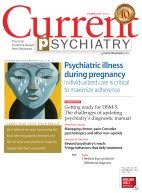David R. Spiegel, MD, Associate professor, Department of psychiatry and behavioral sciences, Director of consultation-liaison services, Eastern Virginia Medical School, Norfolk, VA
Daiana Radac, MD, Resident, Eastern Virginia Medical School, Norfolk, VA
Benzodiazepines are the mainstay of alcohol detoxification treatment, with extensive evidence supporting their efficacy and relative safety. The risk of benzodiazepine-alcohol interaction, however, and psychomotor and cognitive impairments associated with benzodiazepine use may limit early rehabilitation efforts in hospitalized patients. Cross-tolerance with alcohol also limits benzodiazepines’ potential benefit in outpatients with substance use disorders.
Adding anticonvulsants to acute benzodiazepine therapy has been shown to decrease alcohol withdrawal symptom severity, reduce seizure risk, and support recovery, particularly in patients with multiple alcohol withdrawal episodes. After detoxification, long-term anticonvulsant use may reduce relapse risk by decreasing post-cessation craving, without abuse liability.
Although not all studies endorse adding anticonvulsants to benzodiazepines for managing alcohol withdrawal syndrome (AWS), we present 3 cases in which anticonvulsants were used successfully as adjuncts to lorazepam. Valproic acid, levetiracetam, and gabapentin offer advantages in acute and long-term therapy of alcohol dependence with efficacy in AWS, low abuse potential, benign safety profile, and mood-stabilizing properties.Read full text (free access)
Comment on this article
Email the editor
Friday, April 2, 2010
Adjunctive anticonvulsants in alcohol withdrawal
Labels:
alcohol withdrawal,
anticonvulsants,
benzodiazepines
Subscribe to:
Post Comments (Atom)


No comments:
Post a Comment